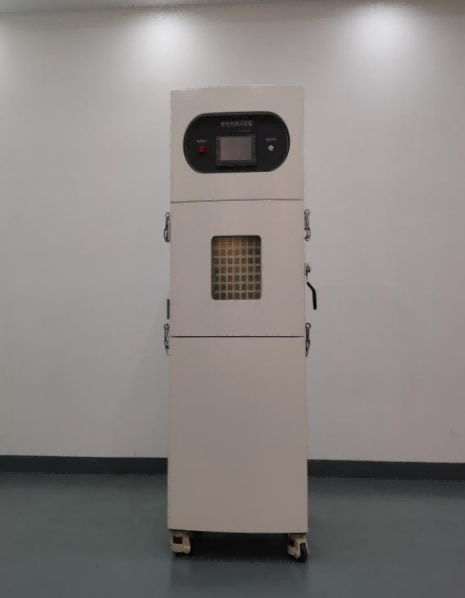Brand :
LinengItem NO :
LN-6003DCompliance :
CE CertificatePayment :
Credit Card, Paypal, T/T , Western Union, LCWarranty :
Two Years Limited Warranty With Lifetime SupportDelivery Time :
In stockWhatsapp:
+86 18659217588WeChat:
18659217588Email:
cassie@lionbatterymachine.comTemperature Control Battery Short Circuit Tester
Introduction
The temperature-controlled battery short-circuit testing machine is designed according to the requirements of various battery short-circuit test standards. According to the standard, the short-circuit device must meet the internal resistance range of ≤5mΩ, so as to obtain the maximum short-circuit current required by the test; in addition, in the circuit design of the short-circuit device It must also be able to withstand the impact of large currents, so we chose industrial-grade DC electromagnetic contactors, all-copper terminals and internal copper plates for diversion. The wide and thick copper plates can effectively improve the heat dissipation effect, make the high-current short-circuit device safer, and effectively reduce the test equipment The loss to ensure the accuracy of the test data.
The short circuit tester adopts PLC automatic control to simulate the external short circuit of the battery, and meets UL1642, UN38.3, IEC62133, GB/T18287, GB/T 31241-2014 and other standards. Record battery voltage, current and surface temperature changes. The short-circuit test machine must have a resistance of 80±20mΩ across the circuit (including circuit breakers, wires and connecting devices), and each circuit can withstand a short-circuit current with a peak value of 1000A. You can choose the short-circuit stop mode: 1. Short-circuit time; 2. Battery surface temperature.
Meet the standard
GB 31241-2014 "Safety requirements for lithium-ion batteries and battery packs for portable electronic products"
MT/T 1051-2007 "Lithium-ion battery for miner's lamp"
SJ/T 11169-1998 (UL1642: 1995) "Safety Standard for Household and Commercial Batteries"
YD 1268-2003 "Safety requirements and test methods for lithium batteries and chargers for mobile communication handsets"
GB/T 19521.11-2005 "Safety Code for Inspection of Dangerous Characteristics of Dangerous Goods of Lithium Battery Packs"
GB/T 18287-2013 "General Specification for Lithium Ion Batteries for Cellular Phones"
SJ/T 11170-1998 (UL2054: 1997) "Safety Standard for Household and Commercial Batteries"
UN 38.3 "Recommendations on the Transport of Dangerous Goods-Manual of Tests and Criteria" Part 3, Section 38.3
UL 1642 "Lithium Battery Standard" 2054 "Household and Commercial Battery Packs"
IEC62133-2012 "Battery and battery packs containing alkaline or non-acid electrolytes-Safety requirements for sealed batteries for portable equipment and good battery packs"
GB/T 8897.4-2008 (IEC 60086-4: 2007) "Primary Batteries Part 4 Safety Requirements for Lithium Batteries"
YDB 032—2009 "Back-up Lithium Ion Battery Pack for Communication"
YD/T 2344.1—2011 "Lithium Iron Phosphate Battery Pack for Communication Part 1: Integrated Battery Pack"
GB/T 21966-2008 (IEC 62281:2004) "Safety requirements for lithium primary batteries and accumulators in transportation"
Test standard requirements
After the battery is fully charged in accordance with the specified test method, place it in an environment of 55°C ± 5°C, and place it for another 30 minutes after the battery temperature reaches 55°C ± 5°C. Then connect the positive and negative terminals of the battery with wires, and ensure that all external resistances are 80mΩ±20mΩ. Monitor the battery temperature change during the test. When one of the following two situations occurs, the test is terminated.
a) The battery temperature drops to 20% lower than the peak value; b) The short-circuit time reaches 24h.
Test result: the battery should not fire or explode, and the maximum temperature should not exceed 150℃
Technical parameters
Control method | PLC touch screen control system (with remote control) |
Voltage | 0-100V |
Short-circuit current | 0-1000A(can be customized as 2000A/3000A/5000A and so on) |
Temperature control box | Normal temperature~150℃ |
Battery surface temperature collection | Temperature sensor: -20℃~130℃ thermocouple |
Temperature control accuracy | 0.1℃ |
Temperature uniformity | ±1℃ |
Temperature control explosion-proof box test space | 500*500*500 mm, can be customized |
Working voltage | AC 220V, 50/60Hz |
Impulse voltage | AC 1kv/1.2-50μs (peak value) 1min |
DC response time | ≤5μs |
Device internal resistance | 80±20mΩ (load current 400A) |
Action time | Pull-in time/release time ≯30ms |
Action characteristics | Cold pull-in voltage ≯66% Us |
Cold release voltage | ≯30% Us, ≮5% Us |
Exhaust fan | Dia 100mm exhaust pipe extends at the rear |
Air supply port | There are two dia 50mm air supply ports on the left side of the box (also used to measure voltage, etc.) |
Window size | 300*300mm, tempered explosion-proof glass with a thickness of 20mm. A movable stainless explosion-proof steel wire screen is installed in front of the glass to increase safety performance and facilitate extraction and cleaning. |
Weight | About 100Kg |
Power supply | AC220V, 50/60Hz |


Quanzhou Lineng Mechinery and Equipment Co., Ltd is a technology-based enterprise, integrating R&D, manufacturing, sales and service. Our company has strong scientific research strength, including more than 20 senior mechanical and electrical engineers, 8 external experts and professors, and more than 160 front-line technical workers.